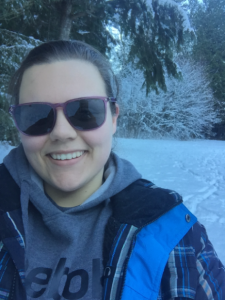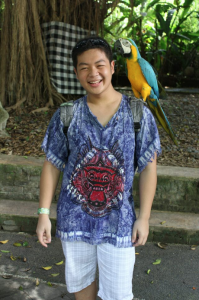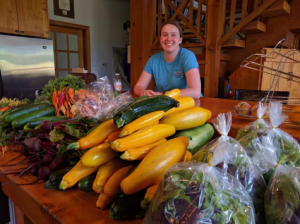Who Are We & LET’S: Learn to Store
“My grandfather used to say that once in your life you need a doctor, a lawyer, a policeman and a preacher but every day, three times a day, you need a farmer” – Brenda Schoepp
Food is integral to our everyday life. Many of us are privileged to be able to access food without worry but for many people, food insecurity is a serious threat. In Pakistan there are currently 77 million people, which is almost half the population, suffering from food insecurity and their caloric intake is below health standards (Government of Pakistan, 2009). In order to approach this issue, food losses need to be addressed, be that waste on the consumer side here in Canada, or post-harvest and storage losses in Pakistan. The objective of our project is to come up with innovative solutions to combat the storage loss of crops, which will improve local food security and increase the economic well-being of the farmers in Punjab, Pakistan.
Our Community Partner…
LET’S is a non-profit organisation that is designed to deliver education and socio-economic development to developing countries in the world (N.A., 2017). This non-profit stands for Learn, Empower, Transform, and Solve and focuses on promoting education around the world (LET’S, 2015b). LET’S has a vision to give universal access to educational, medical, and economical resources to ensure that no one is left behind (LET’S, 2015b). They have developed a device called Takhti, which is a server used to provide educational resources and network connectivity to regions without internet (LET’S, 2015b). In using this device they want to: understand the issues and environment, engage individuals with community development and provide them the tools they need to make a difference, provide communities the tools to employ solutions and reevaluate their strategies while transforming their lifestyles, and provide sustainable solutions for the community by the community (LET’S, 2015a).
A Little About Us…
Kristen Chang
My name is Kristen Chang and I’m a third year Food Market Analysis student at the Land  and Food Systems faculty at UBC. My interests are in business studies with a focus in production, distribution, marketing and trade of food. LFS 350 allows for me to understand food storage through our community project. I was particularly attracted to this project because I took FNH 355 (international nutrition) last summer where it peaked my curiosity of finding ways to improve food security in developing countries.
and Food Systems faculty at UBC. My interests are in business studies with a focus in production, distribution, marketing and trade of food. LFS 350 allows for me to understand food storage through our community project. I was particularly attracted to this project because I took FNH 355 (international nutrition) last summer where it peaked my curiosity of finding ways to improve food security in developing countries.
Sarah Gerrard
 My name is Sarah Gerrard and I am in the BSc. of Food, Nutrition and Health in the Land and Food Systems faculty at UBC. My interests lie in nutrition and sustainability; I hope to one day be involved in the development of food policies where I can help increase food security. I believe this project ties in perfectly with my beliefs and that’s why I chose this project. Through this, I hope to gain insight into how developing countries can be improved through educational resources.
My name is Sarah Gerrard and I am in the BSc. of Food, Nutrition and Health in the Land and Food Systems faculty at UBC. My interests lie in nutrition and sustainability; I hope to one day be involved in the development of food policies where I can help increase food security. I believe this project ties in perfectly with my beliefs and that’s why I chose this project. Through this, I hope to gain insight into how developing countries can be improved through educational resources.
Kevin Wijaya
 My name is Kevin Wijaya and I am a 3rd year in the Food Nutrition and Health program. I have an interest in food production, transport and the economics of the food system. I choose the LET’s Low-Tech Food Storage strategies project because international food systems and storage solutions interest me. I hope through this course I can gain insight into how food storage is an important aspect of international food systems.
My name is Kevin Wijaya and I am a 3rd year in the Food Nutrition and Health program. I have an interest in food production, transport and the economics of the food system. I choose the LET’s Low-Tech Food Storage strategies project because international food systems and storage solutions interest me. I hope through this course I can gain insight into how food storage is an important aspect of international food systems.
JiaYu (Grace) Wang
 My name is Grace and I am currently in the Food, Nutrition and Health major. I like exercising, such as swimming and skiing, during my leisure time. I chose this project because in LFS 250 my professor quoted, “the basic science is nature”. I want to apply this concept in reality, and believe this project can help me make sense of that.
My name is Grace and I am currently in the Food, Nutrition and Health major. I like exercising, such as swimming and skiing, during my leisure time. I chose this project because in LFS 250 my professor quoted, “the basic science is nature”. I want to apply this concept in reality, and believe this project can help me make sense of that.
Lynn Pinnell
My name is Lynn Pinnell and I am a third-year student in Land and Food Systems in Plant and Soil Science. I am interested in human health, food security and environmental sustainability. I choose LET’s Low-Tech Food Storage project because I have learned first-hand while running a market garden how important having simple and effective food storage strategies are to prevent waste and I look forward to learning new strategies for different climates. I believe these innovative solutions can positively affect the people’s health and income by cutting down on food waste.
Plant and Soil Science. I am interested in human health, food security and environmental sustainability. I choose LET’s Low-Tech Food Storage project because I have learned first-hand while running a market garden how important having simple and effective food storage strategies are to prevent waste and I look forward to learning new strategies for different climates. I believe these innovative solutions can positively affect the people’s health and income by cutting down on food waste.
Sunnie Tang
My name is Sunnie Tang and I am a third year student in applied animal biology major. I am interested in animal welfare and finding ways to improve living standards for everyone . I took a course on agroecology (APBI 260) in second year that taught me how to research and find natural ways to apply useful agricultural techniques on less developed regions to solve many problems. I think that this project allows me to link the two courses in a meaningful way. I hope to gain more experience in global agricultural issues through this project in LFS 350!
. I took a course on agroecology (APBI 260) in second year that taught me how to research and find natural ways to apply useful agricultural techniques on less developed regions to solve many problems. I think that this project allows me to link the two courses in a meaningful way. I hope to gain more experience in global agricultural issues through this project in LFS 350!
What Are We Doing?
The main objective of this LFS 350 project is for students to learn about the problems farmers face in developing communities, in contrast to the common farming issues in the developed world. By doing this project, we aim to develop an understanding of how cultural differences play a role in figuring out sustainable solutions to specific problems in remote communities. As for the organisers of LET’S, they hope our research can help them understand how to help farmers improve their crop storage practices in Pakistan, the state of Punjab more specifically. Our research will be utilized to help farmers in Pakistan, while creating an active culture of research and development in UBC with developing communities in mind. Thus far, LET’S wishes to focus its efforts on Pakistan where little information on farming practices is available, yet most of its resources are currently focused on. We aim to find low-tech, low-cost, and short-term storage methods for farmers in the Punjab region of Pakistan. Our overall inquiry question is: are there new and creative ways for farmers in Pakistan to store their crops that is cost-effective relative to the farmer’s’ salary?
Our First Impressions…
As a group, we are excited to be a part of the LET’s Low-Tech Food Storage project. We wish to become more aware of the challenges that developing countries face throughout their farming season. Going into our first meeting, we believed that we had a good understanding of what to expect, however, came to understand that the prevalent issue of food security required more than just research alone. Through working with LET’S on this project, we will be involving the agriculture expertise of individuals in Pakistan as a supplement to the information we obtain online. As mentioned by Ernesto Sirolli (2012), we hope that through collaboration with these professionals will enable us to respect the communities needs while producing potential solutions to a prevalent issue. Through asset-based community development, we can evaluate the existing assets of Pakistan and incorporate them into the LET’S food storage project. As a group of diverse students, we will be able to provide the developing countries’ communities with a resource to ensure everyone has equal and sufficient access to food, year round.
References:
Government of Pakistan. (2009). Hunger Pains: Pakistan’s Food Insecurity. Retrieved from https://www.wilsoncenter.org/sites/default/files/ASIA_100412_PakistFood_rptL0713FINALVERSION.pdf
LET’S International Charitable Association. (2015a). LET’S. Retrieved from http://www.lets-ica.com/.
LET’S International Charitable Association. (2015c). What Is Takhti. Retrieved from http://www.lets-ica.com/what-is-takhti.
N.A. (2017). Project Summary. Retrieved from http://lfs350.landfood.ubc.ca/community-projects/2017-winter-projects/lets-low-tech-storage-strategies/.
Sirolli, E. (2012). Ernesto Sirolli: Want to help someone? Shut up and listen! Retrieved from https://www.youtube.com/watch?v=chXsLtHqfdM